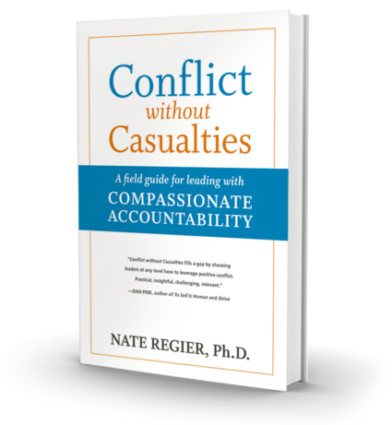
I’m happy to share with you this Guest Post from Nate Regier. This week, he released his new book, Conflict without Casualties. It’s a must-read for leaders everywhere. I’m reading it now!
There’s a time to gather information, analyze options, and weigh the pros and cons. That’s called Resourcefulness. And there’s a time to make a decision and move on. That’s called Letting Go. How do you know when it’s time to let go so you can avoid analysis paralysis?
Resourcefulness can get you to a point where all of the following conditions are met:
- You understand the situation or problem
- You have generated several good options
- More information won’t make the decision any easier
- You have weighed the pros and cons of your several good options
- You have a strategy that can be implemented
- Trying something will teach you more than continuing to analyze it
Once these conditions are met, continued analysis will only paralyze you, your team, and your organization. Resourcefulness won’t help you anymore. The only thing left to do is make a decision, let go, and move on. Why is this so difficult for some people and teams? Because Letting Go requires a completely different skill set than Resourcefulness.
- Resourcefulness is about generating options. Letting Go is about loss of the options not chosen.
- Resourcefulness is about anticipating and planning for outcomes. Letting Go is about going forward with no guarantees.
- Resourcefulness requires analysis and creativity. Letting Go requires courage and faith.
- Resourcefulness requires clear thinking. Letting Go requires emotional vulnerability.
- Resourcefulness is about understanding. Letting Go is about commitment.
One of the most important aspects of moving beyond analysis paralysis is to grieve the loss associated with making a decision. Most people and teams avoid facing this, which is why they get stuck and revert back to more analysis to somehow prevent the inevitable.
Moving beyond analysis paralysis requires acknowledging and feeling the loss of control associated with making a commitment, the loss of options associated with choosing one, and the loss of certainty associated with moving forward into the unknown.
Originally published on the Next Element Blog
About Dr. Nate Regier
Dr. Nate Regier is the co-founding owner and chief executive officer of Next Element, a global advisory firm specializing in building cultures of compassionate accountability. A former practicing psychologist, Regier is an expert in social-emotional intelligence and leadership, positive conflict, mind-body-spirit health, neuropsychology, group dynamics, interpersonal and leadership communication, executive assessment and coaching, organizational development, team building and change management. An international adviser, he is a certified Leading Out of Drama master trainer, Process Communication Model® certifying master trainer and co-developer of Next Element’s Leading Out of Drama® training and coaching. Nate has published two books: Beyond Drama and his latest work, Conflict without Casualties.


Leave a Reply